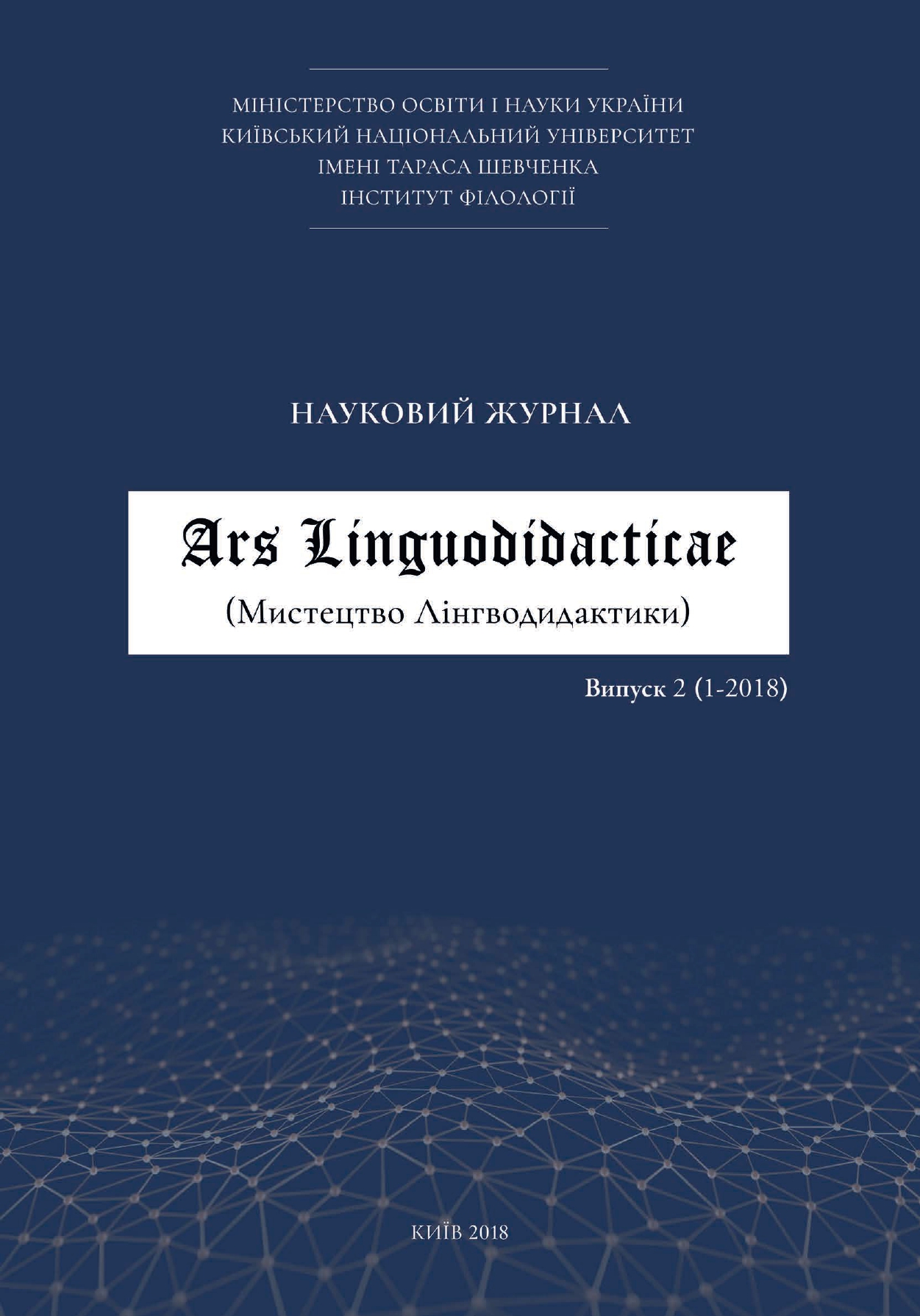ОРГАНІЗАЦІЯ РОБОТИ З АВТЕНТИЧНИМ БРИТАНСЬКИМ ХУДОЖНІМ ФІЛЬМОМ З МЕТОЮ ФОРМУВАННЯ СОЦІОКУЛЬТУРНОЇ КОМПЕТЕНТНОСТІ У МАЙБУТНІХ ФІЛОЛОГІВ
DOI:
https://doi.org/10.17721/2663-0303.2018.2.08Ключові слова:
соціокультурна компетентність, автентичний художній фільм, культураАнотація
У статті описано авторську методику формування англомовної соціокультурної компетентності у студентів-філологів другого року навчання з використанням автентичного художнього фільму. Розглянуто зміст соціокультурної компетентності відповідно кожного складника: 1) когнітивного (знання), 2) поведінкового (уміння); 3) афективно-аксіологічного (ставлення). Представлено структуру курсу. Наведено завдання/вправи запропонованої методики.
Посилання
Trykashna, Yulia. British culture in films. Brytanska kultura u filmakh. Navch.-metod. posibnyk / Y.I. Trykashna. – Kyiv: Logos, 2016. Print.
Trykashna, Yulia. (2017). Formuvannia anglomovnoi sotziokulturnoi kompetentnosti u maibutnih filolohiv z vykorystanniam avtentychnoho khudozhniogo filmu. (Формування англомовної соціокультурної компетентності у майбутніх філологів з використанням автентичного художнього фільму). PhD Thesis. Kyiv. Manuscript
Lazar I. and Huber-Kriegler M., Lussier D., Matei G. S., Peck C. Developing and assessing intercultural communicative competence: a guide for language teachers and teacher educators (Strasbourg and Granz: European Centre for Modern Languages and Council of Europe Publishing, 2007), 44. Print.
##submission.downloads##
Опубліковано
Як цитувати
Номер
Розділ
Ліцензія
Авторське право (c) 2018 Юлія Трикашна

Ця робота ліцензується відповідно до Creative Commons Attribution-ShareAlike 4.0 International License.
Ця робота ліцензується відповідно до Creative Commons Attribution-NonCommercial 4.0 International License.
Політика охорони авторських прав відповідно до умов ліцензії: Creative Commons Attribution-NonCommercial (Атрибуція-Некомерційне використання) 4.0 Міжнародна (CC BY-NC 4.0).
Автори, що публікують свої статті в журналі "Ars Linguodidacticae" (журналі відкритого доступу) зберігають за собою такі права:
- Автори зберігають за собою права на авторство своєї статті та надають журналу "Ars Linguodidacticae" право першої публікації рукопису своєї статті на умовах ліцензії Creative Commons (CC BY-NC 4.0) Attribution License, яка дозволяє іншим особам вільно розповсюджувати опубліковану роботу з обов'язковим посиланням на автора оригінальної роботи та першу оригінальну публікацію в журналі "Ars Linguodidacticae". Інформація про збереження права на авторство надається на титульній сторінці статті.
- Автори зберігають за собою право укладати окремі угоди на неексклюзивне розповсюдження своєї статті у тому вигляді, в якому вона була опублікована в журналі "Ars Linguodidacticae" (наприклад, розміщувати статтю в електронних бібліотеках, архівах та каталогах або публікувати у складі інститутських збірників та монографій), за умови обов'язкового повного посилання на першу оригінальну публікацію в журналі "Ars Linguodidacticae".
- Політика журналу "Ars Linguodidacticae" дає змогу та заохочує розміщення авторами в мережі Інтернет (наприклад в інститутському репозитарії або на персональному сайті) рукопису роботи як до її подання до редакції, так і під час її редакційного опрацювання, оскільки це сприяє продуктивній науковій дискусії та позитивно позначається на оперативності й динаміці цитування статті.
Редакція журналу зберігає за собою видавничі права на:
- зверстані оригінали статей та весь номер журналу;
- оформлення журналу, а також оригінальні ілюстративні та додаткові матеріали;
- репринтні перевидання журналу в друкованому та електронному вигляді.
Політика охорони авторських прав провадиться відповідно до умов ліцензії: Creative Commons Attribution-NonCommercial (Атрибуція-Некомерційне використання) 4.0 Міжнародна (CC BY-NC 4.0).
Для отримання додаткової інформації, будь ласка, прочитайте повний текст Публічної ліцензії CC BY-NC 4.0
Creative Commons Attribution-NonCommercial 4.0 International License.


